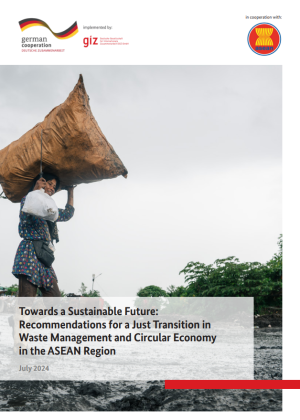
With rapid economic growth and urbanization, ASEAN countries are facing significant challenges related to increasing waste generation, job displacement, and the related environmental and social impacts. The issue of plastic waste pollution, in particular, has garnered widespread attention due to its detrimental effects on marine ecosystems and human health. While environmental impacts
from plastic pollution are profound, the potential for a circular economy—an economic system aimed at eliminating waste and the continual use of resources—remains largely untapped. The Economic Research Institute for ASEAN and East Asia (ERIA) estimates that shifting to a circular economy could lead to economic growth of $324 billion and create 1.5 million jobs across Asia by 2025. In parallel, the World Economic Forum has delineated the top 10 skills vital for future employment, underscoring the evolving demands of the workforce. While the circular economy brings huge opportunities, it is crucial to ensure that just transition principles are embedded in new circular business models to create holistic impact for society and the environment and to mitigate negative impacts that a circular transition can bring. Focusing on the plastic waste value chain is especially critical given its environmental significance and potential for innovation in waste management and circular practices.
Research in 2023 from Bain & Company indicates that ASEAN countries are increasingly recognizing the intertwined nature of economic growth and environmental sustainability. As part of the GIZ regional project ‘Reduce, Reuse, Recycle to Protect the Marine Environment and Coral Reefs’ (3RproMar), which operates across ASEAN countries with a focus on curbing plastic pollution, the research report ‘Towards a Sustainable Future: Recommendations for a Just Transition in Waste Management and Circular Economy in the ASEAN Region’ assesses the inclusivity of waste management practices and circular economy principles within the ASEAN region. The focus lies in integrating just transition principles along the plastic value chain, fostering a more equitable and sustainable framework, and provides key recommendations for stakeholders for implementation. It shall guide implementing agencies and projects like 3RproMar to adapt the projects towards a more inclusive approach and serve as a basis for advising project partners, including ASEAN Member States engaged in the negotiations towards an International Legally Binding Instrument (ILBI), national partner ministries, local pilot municipalities, government officials, policymakers, labour associations, waste management companies, NGOs, communities, waste management companies, NGOs, communities, private sector companies and GIZ.